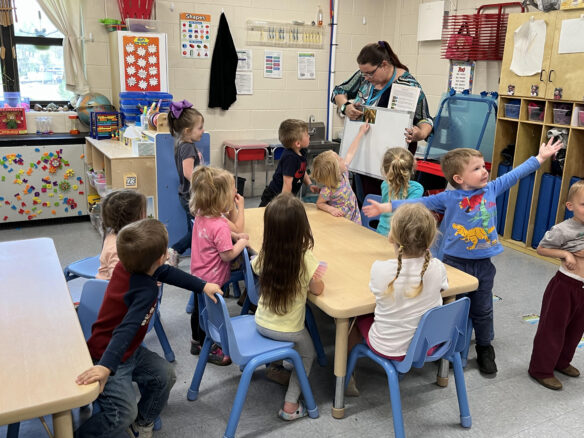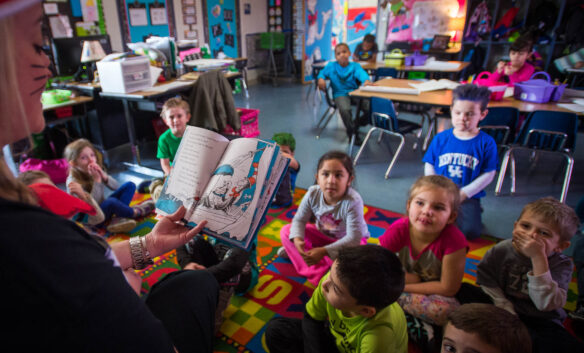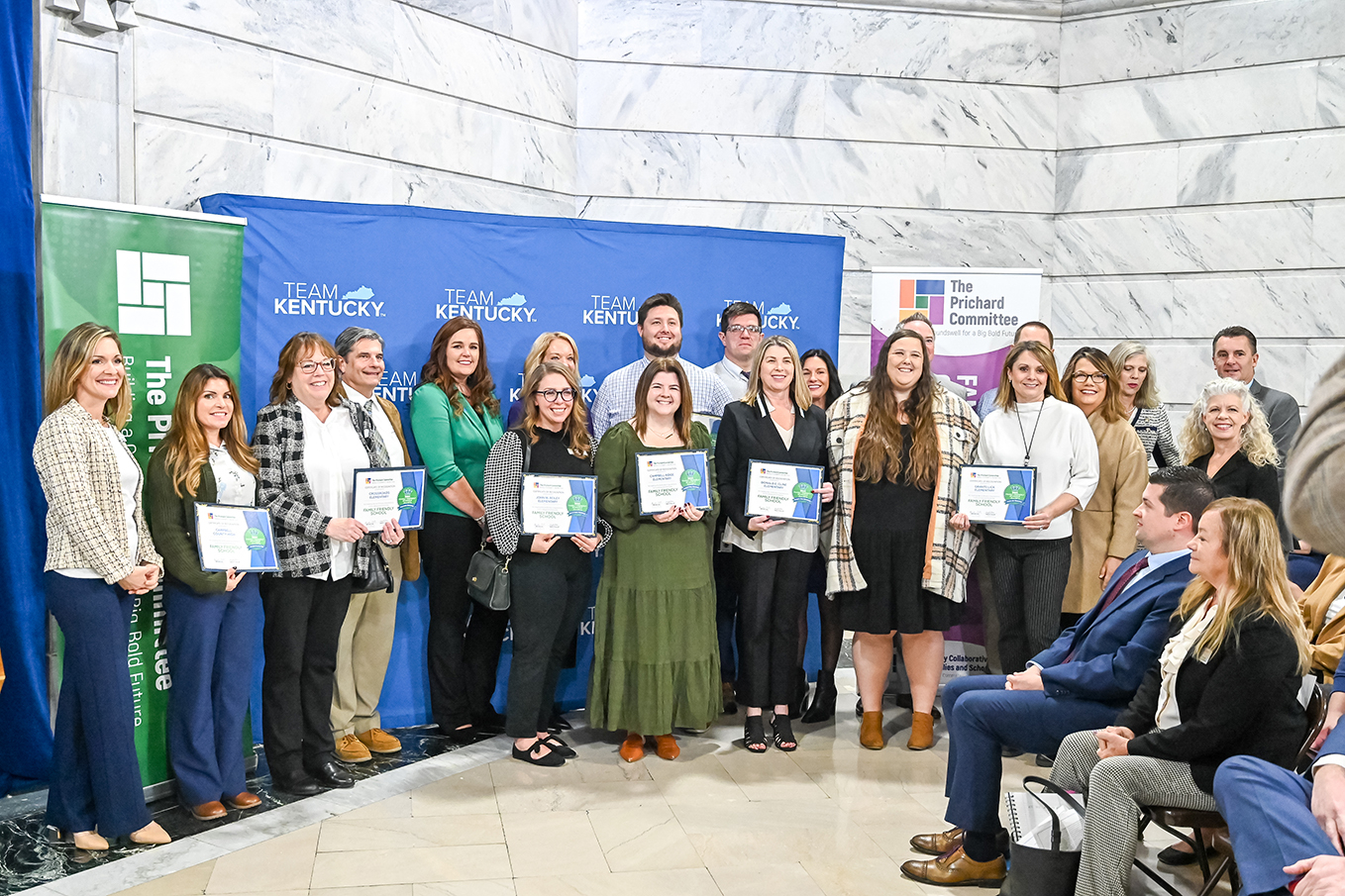 The 2022 Kentucky General Assembly adjourned April 14 after passing a biennial budget for 2022-2024 that includes significant increases for key areas of education. Local school boards and districts will also see changes as a result of other legislation passed, with the most significant changes including House Bill (HB) 9, HB 277, HB 678, Senate Bill (SB) 1 and SB 9. Signed bills will go into effect on July 14, 2022, which is 90 days after the end of the 2022 regular legislative session. This date does not apply to bills with emergency clauses or delayed effective dates.
The 2022 Kentucky General Assembly adjourned April 14 after passing a biennial budget for 2022-2024 that includes significant increases for key areas of education. Local school boards and districts will also see changes as a result of other legislation passed, with the most significant changes including House Bill (HB) 9, HB 277, HB 678, Senate Bill (SB) 1 and SB 9. Signed bills will go into effect on July 14, 2022, which is 90 days after the end of the 2022 regular legislative session. This date does not apply to bills with emergency clauses or delayed effective dates.
HB 1, sponsored by Rep. Jason Petrie, makes significant increases in the state’s budget to P-12 education over the upcoming biennium including:
- Funding full-day kindergarten (approximately $125.9M);
- Increasing Support Education Excellence in Kentucky (SEEK) funding to $4,100 in FY23 and $4,200 in FY24;
- Additional funding for pupil and vocational education transportation;
- Additional funding for National Board Certified Teacher (NBCT) and speech language pathologist salary supplement;
- Record CTE funding and an additional $58,000,000 for Local Area Vocational Education Centers;
- $155,600,000 in FY23 for local area vocation education center renovation projects; and
- Step and rank increases for KY Tech (ATC) employees of $424,000 and $444,000;
- $18,800,000 to support an increase in the per eligible student amount from $183.86 to $210.00 for the Family Resource and Youth Service Centers;
- KY School for the Blind – $8,091,600 FY23, $8,097,800 FY24;
- KY School for the Deaf – $10,876,100 FY23, $10,885,800 FY24;
- Step and rank increases for both KSB and KSD of $534,000 FY23, $549,900 FY24;
- Salary Increases for:
- Certified and Classified Staff – Additional resources are made available to local school districts through an increase in the SEEK resources. The 2022 General Assembly encourages local school districts to provide certified and classified staff a salary or compensation increase; and
- State Employees – provides 8% base salary increment in FY23 on July 1, 2022, no salary increment in FY24, however it is the intent of the General Assembly to provide a salary increment in fiscal year 2023-2024 subject to the completion of the classification and compensation report by the Personnel Cabinet.
HB 9, sponsored by Rep. Chad McCoy, amends existing Kentucky charter school laws by providing state common school (SEEK) funds, locally levied school funds and federal education funds to charter schools; amending charter school authorization requirements to require local school board endorsement as a condition of application for districts with 7,500 students or less; and mandating a charter school pilot project in both Jefferson County and northern Kentucky.
HB 9 also directs the KBE to promulgate administrative regulations to “govern the calculation and distribution of funds due to public charter schools from school districts, the schedule of distribution of funds, and the imposition of fines for late distribution of funds.”HB 9 became effective April 14 after the General Assembly overrode Governor Beshear’s veto and delivered it to Secretary of State Michael Adams.
HB 277, sponsored by Representative Walker Thomas, amends KRS 161.048 to create a new expedited alternative certification pathway, referred to as Option 9, through the use of a residency program. This new route will differ from the other eight options and be available to candidates who have not obtained a bachelor’s degree and will not allow for temporary or provisional certification while completing the route. Option 9 programs will have to be approved by the Education Professional Standards Board (EPSB).
HB 277 also authorizes any person receiving emergency teaching certification during the 2021-2022 school year be eligible to renew that certification during the 2022-2023 school year and was signed by the governor on April 8th.
HB 678, sponsored by Rep. Ed Massey, sets up a two-year pilot project related to school construction that was requested by a group of school districts due to rising construction costs. District construction costs grow for various reasons from supply chain shortages to inflation. Additionally, interest rates are also expected to increase. If costs increase while a school district is awaiting approval, then projects become more expensive – possibly to a point that a project could become cost prohibitive.
To speed up the process, until June 30, 2024, school districts that opt-in to the pilot project do not have to get approval from the Kentucky Department of Education (KDE) for the funding, financing, design, construction, renovation or modification of school facilities. Districts also do not have to get KDE approval for the expenditure of capital funds. Currently, KDE reviews and approves district construction projects prior to the project beginning. Districts are still required to file BG-1 Project Application forms with the department and follow all other applicable laws and regulations.
HB 678 requires a local board that elects to conduct its projects under the provisions of the bill to adopt a resolution by majority vote and submit the resolution to KDE as notice. Districts that opt-in to the provisions of HB 678 are still required to receive KDE approval for District Facility Plans as well as for the acquisition of property and disposal of surplus property. Approval authority is given to the commissioner or designee rather than the Kentucky Board of Education (KBE) to avoid additional time required for the KBE to meet and approve these items. KDE has 30 business days to approve or deny the submission.
HB 678 became effective April 8thwhen it was signed by Governor Beshear.
SB 1, sponsored by Senator John Schickel, moves principal selection and curriculum decisions from school councils to the superintendent. SB 1 embeds language from SB 138, also referred to as the Teaching American Principles Act. This act requires the incorporation of 24 fundamental American documents and speeches into the grade-level appropriate middle and high school Kentucky Academic Standards for Social Studies. Provisions for instruction on current, controversial topics are also included.
While SB 1 does contain an emergency clause in Section 9, it only applies to Section 6 which addresses COVID-19 paid leave days, which reads:
Beginning March 1, 2022, through June 30, 2022, each school district shall 1 grant an employee up to five days of paid leave due to the employee having an active 2 COVID-19 infection documented by a positive COVID-19 test. This leave shall be in 3 addition to any other leave provided by statute or board policy. Leave granted pursuant to 4 this subsection shall not accumulate or carry over beyond the 2021-2022 school year and 5 shall not be transferrable to any other classification of paid leave established by statute or 6 local school district policy.
SB 1 was delivered to Secretary Adams on April 13thafter the General Assembly overrode the governor’s veto.

SB 9, referred to as the Read to Succeed Act, sponsored by Sen. Stephen West, and championed by Rep. James Tipton, provides a multifaceted approach to improve reading outcomes for all students.
Due to the rapidly growing need for literacy acceleration, SB 9 provides more students with assistance than what is possible under existing law, such as those impacted under KRS 158.792 which allocates funds to the reading diagnostic and intervention grant, also referred to as the Read to Achieve (RTA) grant. It is important to note that the RTA grant is not impacted by SB 9 and will remain fully funded to support students with Tier 2 and 3 accelerated learning needs. As part of this multifaceted approach, KDE, local schools and districts, and postsecondary education preparation programs will each play a role creating systemic improvement in reading outcomes for students in grades K-3.
For sustainability, KDE requested, and the General Assembly approved, $22 million dollars in the 2022-2024 biennial budget to implement statewide professional learning and the literacy coaching model as defined in the bill.
SB 9 became effective when it was signed by Governor Beshear on March 29.
Other House Bills include:
- HB 5 (R. Heath): West Kentucky SAFE fund which, among other things, provides $30 million for local school districts impacted by the December tornado. The KDE is already distributing these funds to districts;
- HB 10 (D. Osborne): Does away with the pre-filing of bills;
- HB 33 (J. Branscum): School facilities clean-up bill that, among other things, deletes reporting requirement for efficient design;
- HB 44 (B. McCool): Amends KRS 159.035 to allow a local school district’s attendance policy to include provisions for a student’s mental or behavioral health status;
- Amended to fix issue with SB 1 so teachers can’t be criminally charged for violation of anti-CRT provisions included when SB138 was added to the bill;
- HB 63 (K. Bratcher): Amends KRS 158.4414 to require the assignment of school resource officers to every school campus by August 1. If sufficient funds and personnel are not available, school districts shall fulfill the requirement as approved by the state school security marshal. SB 120 was added as an amendment which creates new sections of KRS Chapter 158 to allow local boards of education to establish a police department for local school districts;
- HB 121 (R. Huff): Requires a public comment period at local board of education regular meetings;
- HB 194 (D. J. Johnson): Amends KRS 158.143 to provide that a student enrolled in a district-operated alternative education program shall be eligible to seek attainment of a High School Equivalency Diploma under certain conditions;
- HB 283 (S. Riley): Amends KRS 160.380 to permit a school district to accept a background check completed by an accredited teacher education institution for a student teacher;
- HB 397 (M. Dossett): Waives up to 15 student attendance days for days school districts were closed due to the western Kentucky tornado disaster. Days waived count as completed employment contract days for school personnel; and
- HB 680 (C. Massey): Establishes a virtual computer science career academy and directs WeLeadCS to implement the program.
Other Senate Bills include:
- SB 25 (M. Wise): Provides COVID temporary remote instruction days;
- Remote instruction may be provided to each school in a school district, including to a particular grade, classroom or group of students within the school, for up to 10 days per school under this section. A school district shall not temporarily assign every student in the district to remote instruction under this section unless all students in the school district are located in a single school facility;
- These 10 days are in addition to the 10 Non-Traditional Instruction (NTI) Days each district receives per KRS 158.070(9);
- SB 59 (M. Wilson): Amends KRS 158.6453 to delete the 10th grade college admissions examination and amends KRS 158.6455 to add postsecondary readiness indicators to the statewide accountability system;
- SB 60 (M. Wise): Amends KRS 157.3175 to provide a dispute mechanism if a local school district is unable to obtain certification from a Head Start that the Head Start program is fully utilized. If there is a dispute, the Kentucky commissioner of education would make a determination whether or not a Head Start program was being fully utilized and “may execute the certification required by subsection (6)(q) on behalf of the Head Start director;”
- SB 61 (M. Wise): Amends KRS 158.142 to delete end-of-course examination and removes naming ACT as the vendor when establishing benchmark requirements from the Early Graduation Program. SB 61 also requires the KBE to promulgate requirements for the Early Graduation Program. As a result, amendments to the minimum requirements for high provided under 704 KAR 3:305 will be needed;
- SB 83 (R. Mills): Restricts transgender girls from participating on girls’ sports teams starting in in 6th grade;
- SB 102 (M. Wise); Amends KRS 158.4416 to require local superintendents to report information on school-based mental health services providers in the district to KDE. KDE will compile and maintain the information and report annually to the Interim Joint Committee on Education.
- SB 150 (R. Mills): Disaster relief bill that, among other things, appropriates $120,890,000 from the West Kentucky State Aid Funding for Emergencies Fund to the Department of Military Affairs budget unit;
- SB 151 (J. Howell): Amends KRS 158.070 to permit the administrator of a school that participates in the Federal School Breakfast Program to authorize up to 15 minutes of the student attendance day to provide the opportunity for children to eat breakfast during instructional time;
- SB 164 (M. McGarvey): Establishes the Imagination Library of Kentucky Program.




Leave A Comment